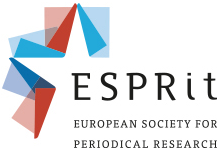ESPRit online seminar 13 May 2022
The third ESPRit online seminar series takes as its general theme ‘sources beyond the periodical text’. It launched on 8 April 2022 with an opening lecture by Filippos Tsiboglou, Director General of the National Library of Greece. The second session, held on 13 May 2022 at 3 PM CET, featured two research presentations:
Zsuzsa Török, Research Centre for the Humanities, Institute for Literary Studies, Budapest, ‘Sources for Anonymous Contributors to Periodicals: The Case of the Hungarian Stephanie Wohl and The Scotsman’
Stephanie Wohl, a Hungarian writer and journalist from Budapest, contributed a series of thirty-two letters between 1875 and 1881 to The Scotsman, Scotland’s iconic Edinburgh-based national newspaper. Wohl reported on Hungarian life and manners and covered a range of topical events usually associated with special correspondents. Her articles followed the tradition of journalistic anonymity and carried the by-line ‛From an Occasional Correspondent’, ‛By an Occasional Correspondent’, ‛From a Hungarian Correspondent’, or ‛From our own Correspondent’. Relying on digital resources and archival research, this paper proposes a transnational approach to periodicals and periodical contributors. It provides a methodological case study using the example of Stephanie Wohl’s contribution to The Scotsman, focusing on the challenge of establishing her authorship. In doing so, it will introduce a research procedure that consists of identifying a corpus of articles supposedly authored by Wohl. This corpus has been delineated relying on Hungarian short news items testifying for Wohl’s engagement with foreign media. Benefitting of the ProQuest’s British Periodicals multidisciplinary database, it was possible to identify this body of texts as publications that came out in The Scotsman. Finally, making use of The Scotsman’s business records preserved in the National Library of Scotland, there is a strong possibility to certify that Wohl had indeed authored these texts. Though the articles have not been signed by Wohl, yet, the archival material contains information pointing to her undeniable authorship. The paper concludes that sources beyond the periodical text are crucial in determining the identity of anonymous periodical contributors. These sources, moreover, may open up new, unexpected avenues for the study of international communication networks, and, in Wohl’s case, of strategic collaboration between émigrés and their homeland contacts.
Levente T. SZABÓ (Ph.D. habil.), Babeș-Bolyai University, ‘Reconstructing the Entangled History of the First International Journal of Comparative Literary Studies’
The multilingual Acta Comparationis Litterarum Universarum (1877-1888) is one of early comparative literature's most fascinating and puzzling phenomena. Founded by two Eastern European polyglots, edited in Kolozsvár/Cluj/Klausenburg and London, the first review specialized in the emerging comparative literary discipline succeeded in attracting around 120 collaborators worldwide. This broad linguistic and cultural appeal made the journal the perfect frame for the most diverse and radical methodological questions, experiments, and opinions.
Despite the high interest for the pioneering journal, its extreme multilingualism and the diversity of its collaborators made it almost impossible to track the wide-ranging history of this crucial little periodical. Based on continued efforts of archival research of more than a decade, my paper attempts to survey the role archival materials could play in reconstructing the entangled visions of comparative literature standing behind this important early institution of comparative literary studies.
